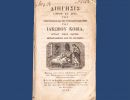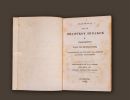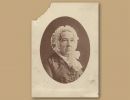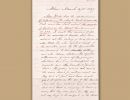Investing in Education, Saving the Soul
Missionary expeditions to Greece from America had as an objective to proselytize and “civilize” the Greek populations by means of education. Protestant tracts in Greek were first published in Malta and after 1831 in Greece itself.
Reverent Jonas King, who was later persecuted, had been asked by Governor Ioannis Kapodistrias to supply schools with missionary texts, and missionaries were originally welcome as they filled a gap, especially in the education of girls. The missionaries focused on elementary education and especially on establishing schools for girls. They founded schools in Tinos (Jonas King), Argos (Elias Riggs and Nathan Benjamin), Areopolis of the Mani (Samuel R. Houston and George W. Leyburn) and Athens (Jonas King and Mr. and Mrs. Hill) where they used the Monitorial System of “mutual instruction” in which the older or better scholars taught the younger or weaker pupils. Moreover, Emma Willard and the Troy Society played an important role in training female teachers to staff schools for girls. The work of the Protestants was soon challenged by the conservative faction of the Orthodox Church: all missionary books were banned from schools in 1835 and six years later no religious teaching was permitted other than the catechism of the Orthodox Church. This marked the end of missionary expeditions to Greece.
Despite persecution, the school founded in Athens by John Henry Hill and Fanny Mulligan Hill (Hill Memorial School) not only managed to achieve a high degree of integration into Greek society but also exerted the most important influence on the Greek education system, while Jonas King continued his missionary activity that resulted in the foundation of the First Greek Evangelical Church in 1871.
In addition to edifying and Christian religious books for children and adults, in the 1820s and 1830s the missionary printing presses also produced many educational and scientific books.
-
missionaries12
In addition to edifying and Christian religious books for children and adults, in the 1820s and 1830s the missionary printing presses also produced many
educational and scientific books.
-
missionaries21
Διήγησις αληθινή και ωραία της ανδραγαθίας και του ευτυχούς θανάτου του Ιακώβου Κοβία, Άγγλου τινός ναύτου. Εν Μελίτη: Αμερικανική Τυπογραφία, 1824.
Gennadius Library, American School of Classical Studies at Athens
-
missionaries16
Αδαμάντιος Κοραής, Σύνοψις της ιεράς ιστορίας. Εν Ερμουπόλει: Φιλελληνικό Τυπογραφείο εξ Αμερικής Ι. Ι. Ροβέρτσος, 1835.
Gennadius Library, American School of Classical Studies at Athens
-
missionaries13
Samuel Sheridan Wilson, Αποθήκη επιστημονική, ήτοι εύκολος εισαγωγή προς τας τέχνας και επιστήμας. Εν Μελίτη, 1832.
Gennadius Library, American School of Classical Studies at Athens
-
missionaries17
Διδασκαλία περί του σφαιρικού πίνακος ή αριθμομέτρου κατά τον Πεσταλότση. Εν Μελίτη, 1836.
Gennadius Library, American School of Classical Studies at Athens
-
missionaries22
Samuel Griswold Goodrich, Των παιδίων η Γεωγραφία. Με επτά γεωγραφικούς πίνακας και εβδομήκοντα τρεις εικονογραφίας υπό Πέτρου του Ομιλητού. Εν Μελίτη: εκ της Αμερικανικής Τυπογραφίας, 1832.
Gennadius Library, American School of Classical Studies at Athens. Gift of Curtis Runnels
-
missionaries20
Students of the Hill School on the Acropolis. 1860. Photograph by Filippos Margaritis.
Lena Ioannidis Collection, Hill Memorial School, Historical Archives
-
missionaries14
John Henry Hill
Hill Memorial School, Historical Archives
-
missionaries15
Frances Maria (Fanny) Mulligan Hill.
Hill Memorial School, Historical Archives
-
missionaries19
Embroidery by the Hill student Maria Dragoumi with the alphabet in Greek and English.
Hill Memorial School, Historical Archives
-
missionaries18
A manual for sewing translated from the English.
Εγχειρίδιον της τέχνης του διδάσκειν το ράψιμον εις στοιχειώδη σχολεία. Εν Μελίτη, 1837.
Gennadius Library, American School of Classical Studies at Athens
-
missionaries10
Letter of Fanny Hill to the Anglo-American Committee informing them that they house 212 Cretan refugees at the Hill School in Athens, where they also offer them instruction. March 6 [18], 1867.
Hill Memorial School, Historical Archives, Folder 7, 18
In addition to edifying and Christian religious books for children and adults, in the 1820s and 1830s the missionary printing presses also produced many
educational and scientific books.
Διήγησις αληθινή και ωραία της ανδραγαθίας και του ευτυχούς θανάτου του Ιακώβου Κοβία, Άγγλου τινός ναύτου. Εν Μελίτη: Αμερικανική Τυπογραφία, 1824.
Gennadius Library, American School of Classical Studies at Athens
Αδαμάντιος Κοραής, Σύνοψις της ιεράς ιστορίας. Εν Ερμουπόλει: Φιλελληνικό Τυπογραφείο εξ Αμερικής Ι. Ι. Ροβέρτσος, 1835.
Gennadius Library, American School of Classical Studies at Athens
Samuel Sheridan Wilson, Αποθήκη επιστημονική, ήτοι εύκολος εισαγωγή προς τας τέχνας και επιστήμας. Εν Μελίτη, 1832.
Gennadius Library, American School of Classical Studies at Athens
Διδασκαλία περί του σφαιρικού πίνακος ή αριθμομέτρου κατά τον Πεσταλότση. Εν Μελίτη, 1836.
Gennadius Library, American School of Classical Studies at Athens
Samuel Griswold Goodrich, Των παιδίων η Γεωγραφία. Με επτά γεωγραφικούς πίνακας και εβδομήκοντα τρεις εικονογραφίας υπό Πέτρου του Ομιλητού. Εν Μελίτη: εκ της Αμερικανικής Τυπογραφίας, 1832.
Gennadius Library, American School of Classical Studies at Athens. Gift of Curtis Runnels
Students of the Hill School on the Acropolis. 1860. Photograph by Filippos Margaritis.
Lena Ioannidis Collection, Hill Memorial School, Historical Archives
John Henry Hill
Hill Memorial School, Historical Archives
Frances Maria (Fanny) Mulligan Hill.
Hill Memorial School, Historical Archives
Embroidery by the Hill student Maria Dragoumi with the alphabet in Greek and English.
Hill Memorial School, Historical Archives
A manual for sewing translated from the English.
Εγχειρίδιον της τέχνης του διδάσκειν το ράψιμον εις στοιχειώδη σχολεία. Εν Μελίτη, 1837.
Gennadius Library, American School of Classical Studies at Athens
Letter of Fanny Hill to the Anglo-American Committee informing them that they house 212 Cretan refugees at the Hill School in Athens, where they also offer them instruction. March 6 [18], 1867.
Hill Memorial School, Historical Archives, Folder 7, 18














